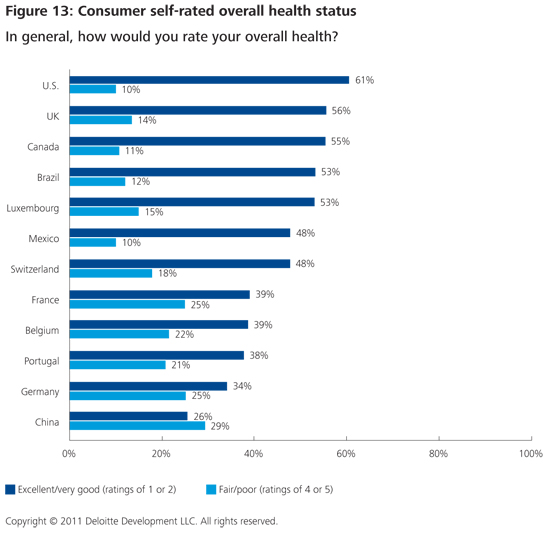New Report by Deloitte Center for Health Solutions
According to a new report by Deloitte Center for Health Solutions, 55% of both Americans and Germans have been diagnosed by a health professional as having one or more chronic conditions. This compares to 52% of Canadians, 50% of the French, 42% in Switzerland and in 41% in the United Kingdom. Yet a much greater proportion of Americans self-rate their overall health as excellent or very good compared to their European counterparts. For instance, only 10% of Americans consider their health fair or poor compared to one-quarter of Germans. Yet the same proportion of residents from both countries has a chronic condition.
I wonder if Austin and Aaron will post this chart?



Aaron and Austin? No way they would post a chart like this. It makes the US system look good.
Does this means that our health care system isn’t the worst in the world? No wonder this is the ony place I have seen this chart.
Interesting. This still doesn’t explain away the fact that we have the most expensive healthcare system by far, and lower average life expectancy than a host of countries. I wonder if Devon and John will post that chart. I wouldn’t say that self-perception of health is necessarily the best marker of actual health (or the quality of the health care system), but it’s certainly not a meaningless finding.
Unfortunately, this reminds me of a New England Journal of Medicine article about the placebo effect and patient perception of illness. The study found that the objective measure of disease statistics showed that placebo and acupuncture didn’t help asthma patients, but that patients felt better.
The idea that Americans perceive themselves as having better health suggests, to my mind, a placebo effect. Perhaps thinking that the healthcare system is the best in the world creates feelings of well-being that distorts a patient’s perception of his/her illness.
Other surveys have found Germans self rate their health status lower than the evidence suggests they should.
@Eric-could you please tell us were to look for the evidence that the U.S. health care system has higher costs?
OECD data are not informative as they only measure expenditure and it is well known that a) the national accounting systems are dissimilar, b) that losses due to waiting lists are not counted, and c) that nationalized system practice price suppression so their expenditure figures do not give a very good accounting of true costs.
With respect to the actual measures of health requested by @vtraweek, there are studies suggesting that the U.S. population has better blood pressure control, better treatment of kidney failure, and enjoys more preventive health screening. The results for cancer have been widely publicized and do not need repeating.
That’s a sensible answer to a challneging question
Hi my family member! I want to say that this post is amazing, great written and come with approximately all important infos. I’d like to look extra posts like this .